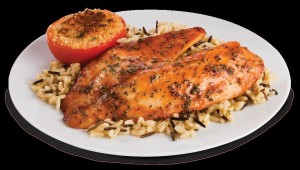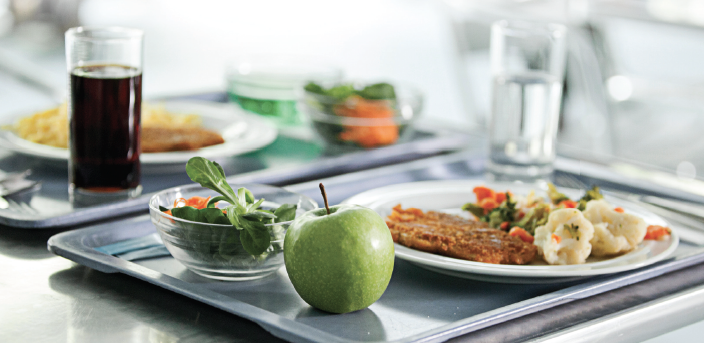By Julie Kendrick, Catersource magazine, January 2015
 “A vegan, a vegetarian, a girl who keeps kosher, and a boy with celiac disease all walk into a college cafeteria … and each finds safe, delicious food to eat.”
“A vegan, a vegetarian, a girl who keeps kosher, and a boy with celiac disease all walk into a college cafeteria … and each finds safe, delicious food to eat.”
Wait, where’s the punchline? For Beth Winthrop, registered dietitian and national wellness director for Sodexo Campus Services Division, there isn’t one. She’s nothing but serious about the need to flexibly accommodate an increasing number of food restrictions at her organization’s more than 850 campus education locations. “I really love the campus services environment, because everyone is willing to go out of their way to help students have a good experience,” she says. “And if you can earn the trust of an allergy-affected family, that’s a really great thing.”
Simple Servings plan
Winthrop has a number of innovations to help students avoid restricted foods and still enjoy delicious dining options. The Simple Servings plan, offered at more than 75 of Sodexo’s resident dining venues, is an allergen-free station open to all diners. It serves simply prepared meat, fish, and chicken dishes, along with vegetables and gluten-free starchy side dishes prepared with a minimum of sauces or add-ins. The station segregates all of its ingredients and utensils in the main kitchen, and also offers food-forward prep at the station. “If the student can see the rice cooker right there on the counter, and watch the stir fry being made, it can build a feeling of trust,” Winthrop says. She also notes the station is popular with those who don’t have any restrictions. “There are a lot of people who just like simple food, we’ve found.” The program has been receiving industry attention, and was recently named Best Wellness Concept in Food Management’s 2013 Best Concept Awards competition.
From pizza & fries to mindful choices
Winthrop sees the campus setting as the perfect R&D laboratory for the development of new menu options, since the college setting is very diverse. “We have so many different types of customers,” she says. “They range from 18-year-olds who are happy to be away from family rules and just eat pizza and fries at every meal, to students who are thinking deeply about food systems and want to know how we’re managing issues like farm-to-table and GMOs.”
To help address those deeper concerns, Winthrop’s group developed Mindful, a new healthy food marketing program which recently won a “Best Concept” award from Food Management. Mindful’s colorful recipes and marketing attract customers running in for a quick meal as well as those concerned with every aspect of a meal’s ingredients. “It’s a wellness offer that reaches across all our segments, designed to make it easy for people to make a healthy choice,” Winthrop says.
From campus to catering – lessons learned
During her presentation at the March conference, Winthrop will focus on the universal aspects of dealing with food restrictions, and specific ways to provide excellent catered cuisine and hospitality to guests with special dietary needs. “Successful caterers are very careful and organized people,” Winthrop says. “If you get to a venue that’s two hours away from your prep kitchen, and you’ve forgotten forks, you’re in trouble. In the same way, you need a tight system for knowing about guest food restrictions ahead of time, and you need to ensure your transportation phase keeps things separated in order to avoid cross-contact.”
 Thinking ahead
Thinking ahead
Winthrop acknowledges that the campus environment allows her staff to be briefed in advance on restrictions from every student-diner. “For a caterer, however, people often just show up and expect to be fed in a way that’s compliant with their restrictions,” she says. “It’s important to have a system in place that allows people to communicate about special needs in advance, but sometimes that just doesn’t happen.”
Winthrop encourages caterers to plan menus with an eye toward accommodating those who might have special dietary needs. “In the way you’ve always had a few vegetarian options ready ‘just in case,’ it’s a good idea to plan ahead for the possibility of other restrictions, too,” she says. “For example, if you don’t have safe food offerings for the nut-free eater, they might take a dangerous chance and eat the food anyway, or go hungry, and neither of those are good options. With a little foresight, you can be more prepared. For example, if you’re making scalloped potatoes, which are gluten-free, do you really need to sprinkle breadcrumbs on top? Or if you create a parfait, it might be fine for someone with nut allergies, but if you garnish it with almonds, then they can’t eat it.”
No matter what you’re serving, Winthrop suggests thorough training for prep staff on procedures to minimize contact between restricted foods and the larger menu. “That philosophy extends to methods of service, too,” Winthrop says. “Don’t put a nut-free entrée on a serving tray with seven other dishes.”
Guest relations
Front-of-house dynamics are especially important for a special-diet guest. “While they do want to know you’ve addressed their needs, they also don’t want to be singled out or made to feel different,” Winthrop says. “Having a waiter arrive at a table and announce, ‘Who’s the gluten free plate?’ is a big no-no.” Staff should be well-trained to confirm the ingredient list for each item. “But waitstaff should never assure someone that a food is perfectly fine for them to eat,” Winthrop stresses. “If there are questions, the guest should be directed to the chef or the manager.”
Looking to the future
While many in the catering industry are accepting that issues of food restrictions are the “new normal,” it seems to be an issue continuing to increase in intensity. According to Food Allergy Research & Education (FARE), 15 million Americans have food allergies. Many more voluntarily restrict their diets for religious, ethical, and wellness reasons. FARE funds research to accelerate the development of safe, practical therapies that would protect individuals with food allergies against life-threatening anaphylaxis, but no cures are in the pipeline at present. “In the meantime, this is our reality, and we all have to learn how to thrive in it,” Winthrop says.







